 I always dreamed about to go to another country where I could live, not just travel. Of course, it would be good to have a job as well. There are a few professions that allow you such maneuvers, but fortunately China gives the chance to work without any special papers - the demand of English teachers is enormous. That gave me a chance to dreams come true.
I always dreamed about to go to another country where I could live, not just travel. Of course, it would be good to have a job as well. There are a few professions that allow you such maneuvers, but fortunately China gives the chance to work without any special papers - the demand of English teachers is enormous. That gave me a chance to dreams come true.
Who can apply for an English Teacher position in China? Required criteria are: an university degree (Bachelor or Master) and a clear criminal record. A very common requirement is English as a native language, or in other words, a passport from USA, Canada, Australia, New Zealand, Great Britain, Ireland or South Africa. Fortunately "often" does not mean "always" - you simply need to find a school which desperately looking for employees (Korea and Japan rather employ native speakers only). So the easiest way for "non-professionals" is to try to apply when the school year just started, or it's in the progress already. Of course some support papers might be useful, if it can prove your English language connections – in our case diploma from Australian college and passed state examination IELTS helped. Despite it, the agency have been requested the last workplace references from Sydney. The other expected document is the proof of teaching experience, and I am officially a sport teacher, and Ewelina has a degree in pedagogy. After all we had to make a medical examinations - the request of Chinese Embassy. This is a set of tests - including blood, chest X-ray, ECG, etc. We have done our medicals tests within few hours in Kazakhstan:) In China even married couples with children are welcome to work.
 Now, how to look for an employer? Generally there are two ways. One through the agency, the other one by contacting the school yourself. Choosing the agency is convenient - you write to them, give them your preferences (location, school type, number of classes, salary, etc.), and they are trying to find something for you. Unfortunately, as the agencies, and particularly those in China, would be nice until you sign the contract (read: until they get a commission) - then you're "nobody" for them. At least I have my own experience with Angelina agency. Finding school yourself is probably the best way - on the Internet it's not such a big problem. What do I recommend? - Google search and you'll find it (a few links below, but I do not know if these agencies are good), www.jobs.echinacities.com, www.teachabroadchina.com, www.eslcafe.com. Maybe this site will be helpful www.eslteachersboard.com where you can read forums, reviews, contact with teachers, announcements, etc.
Now, how to look for an employer? Generally there are two ways. One through the agency, the other one by contacting the school yourself. Choosing the agency is convenient - you write to them, give them your preferences (location, school type, number of classes, salary, etc.), and they are trying to find something for you. Unfortunately, as the agencies, and particularly those in China, would be nice until you sign the contract (read: until they get a commission) - then you're "nobody" for them. At least I have my own experience with Angelina agency. Finding school yourself is probably the best way - on the Internet it's not such a big problem. What do I recommend? - Google search and you'll find it (a few links below, but I do not know if these agencies are good), www.jobs.echinacities.com, www.teachabroadchina.com, www.eslcafe.com. Maybe this site will be helpful www.eslteachersboard.com where you can read forums, reviews, contact with teachers, announcements, etc.
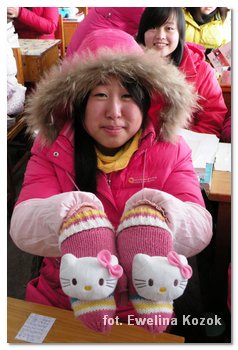 Usually a half or one academic year contracts are offered (5 or 10 months) - more precisely the school year runs from beginning of September till late June. When we find a school that wants to hire us, we send them scanned required documents by e-mail (original and translated a clear criminal record, the diplomas, English exams, work references, resume, passport, picture). After it waiting remains. In our case, we waited much longer than we were promised, but it is because agency asked us for the following documents not at once, but one by one. Finally the agency told us that the school require an interviewed us (on Skype). After the successful interview we waited until the school sent us a contract, we've read it, clarified some points, and then signed it, scanned and sent it back via email. Then they need to issue an official work permission and other government document and send it back to you by traditional mail, as you need to submit the original papers in the Chinese Embassy. When you received it, you take it together with a medical examination, completed visa form and passport photo, and you just wait until your working visa (Z) application will be finalized. We did it in two days, by priority processing. Another note – it's much easier to apply for a working visa in country of your residence. We did in the third country and that was much more complicated (two months paper work). In China, you cannot exchange tourist visa "L" on the working visa “Z”, you would have to go abroad, for example to Hong Kong. There is also a business visa "F", but it has different restriction and you need to often renew it.
Usually a half or one academic year contracts are offered (5 or 10 months) - more precisely the school year runs from beginning of September till late June. When we find a school that wants to hire us, we send them scanned required documents by e-mail (original and translated a clear criminal record, the diplomas, English exams, work references, resume, passport, picture). After it waiting remains. In our case, we waited much longer than we were promised, but it is because agency asked us for the following documents not at once, but one by one. Finally the agency told us that the school require an interviewed us (on Skype). After the successful interview we waited until the school sent us a contract, we've read it, clarified some points, and then signed it, scanned and sent it back via email. Then they need to issue an official work permission and other government document and send it back to you by traditional mail, as you need to submit the original papers in the Chinese Embassy. When you received it, you take it together with a medical examination, completed visa form and passport photo, and you just wait until your working visa (Z) application will be finalized. We did it in two days, by priority processing. Another note – it's much easier to apply for a working visa in country of your residence. We did in the third country and that was much more complicated (two months paper work). In China, you cannot exchange tourist visa "L" on the working visa “Z”, you would have to go abroad, for example to Hong Kong. There is also a business visa "F", but it has different restriction and you need to often renew it.
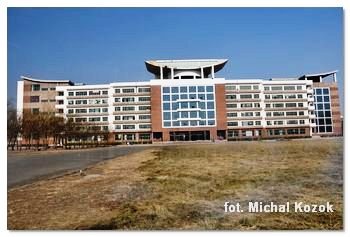 Schools usually offer 16 to 20 hours a week. Wages are rarely less than 4,000 Y per month (400 €) and for professional teachers can reach even more than 10,000 Y (1,000 €). In addition to salary, usually the package also includes a return plane ticket to China (a half-year contract just one-way ticket), and accommodation with all bill expenses. We should also get a travel allowances, paid monthly holiday (1-year contract), sick leave and extra holidays during: two weeks in Chinese New Year (Spring Festival), the first week in May, same in October, two days on Christmas.
Schools usually offer 16 to 20 hours a week. Wages are rarely less than 4,000 Y per month (400 €) and for professional teachers can reach even more than 10,000 Y (1,000 €). In addition to salary, usually the package also includes a return plane ticket to China (a half-year contract just one-way ticket), and accommodation with all bill expenses. We should also get a travel allowances, paid monthly holiday (1-year contract), sick leave and extra holidays during: two weeks in Chinese New Year (Spring Festival), the first week in May, same in October, two days on Christmas.
Now I will give you in detail how these things looked like in Linyi Normal University, Yishui branch (Shandong Province):
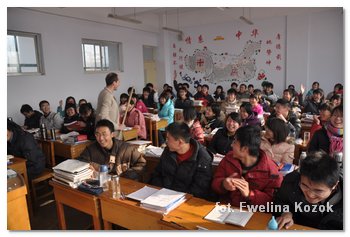 - 16 hours a week, lesson lasts for 45 minutes and brakes take 10 minutes. In the first semester I had 15 hours, Evelina for 6 weeks even had less than 10 hours. Classes weren't usually in a row exp. maximum of 3 units in the row, but most times happened two hours in the morning and one hour in the afternoon (or vice versa). I had a fixed schedule for the first half year, but the next semester each week was different. In the first semester I had always the same classes on the same English level, so I had to prepare only one lesson for a whole week and repeat it in all classes. The next semester I had a different classes and different levels each week - a lot more work, but less monotony. Classes were held from Monday to Friday from 8 am to 4:30 pm. In addition we were asked to lead "English Corner" - meeting with students with voluntary participation.
- 16 hours a week, lesson lasts for 45 minutes and brakes take 10 minutes. In the first semester I had 15 hours, Evelina for 6 weeks even had less than 10 hours. Classes weren't usually in a row exp. maximum of 3 units in the row, but most times happened two hours in the morning and one hour in the afternoon (or vice versa). I had a fixed schedule for the first half year, but the next semester each week was different. In the first semester I had always the same classes on the same English level, so I had to prepare only one lesson for a whole week and repeat it in all classes. The next semester I had a different classes and different levels each week - a lot more work, but less monotony. Classes were held from Monday to Friday from 8 am to 4:30 pm. In addition we were asked to lead "English Corner" - meeting with students with voluntary participation.
 - the school paid us 4,000 Y per month per person (400 €). "Monthly paid" only in theory - in fact they never paid on time, sometimes with several weeks delay and we had to chase them to get a payment. Maybe 4,000 Y is not so much, but life is cheap here! Food does not cost more than 1,000 Y per month per person and we almost didn't have other major expenses - gym pass for 150 Y and massage four times a month for 200 Y. We spent the rest of savings during the holiday breaks and weekend trips. According to the contract we could exchange monthly 30% earned yuan into dollar.
- the school paid us 4,000 Y per month per person (400 €). "Monthly paid" only in theory - in fact they never paid on time, sometimes with several weeks delay and we had to chase them to get a payment. Maybe 4,000 Y is not so much, but life is cheap here! Food does not cost more than 1,000 Y per month per person and we almost didn't have other major expenses - gym pass for 150 Y and massage four times a month for 200 Y. We spent the rest of savings during the holiday breaks and weekend trips. According to the contract we could exchange monthly 30% earned yuan into dollar.
- air ticket had to be purchase by ourselves and then school refund it. However, in practice the ticket refund was a nightmare. We started teaching on 5th November due to visa delays. However, our agreement with the school (through the agency) was that even in those circumstances we are treated the same way as the conditions for one-year contract, so paid holidays and return air ticket (in our case Mongolia - China - Australia). Such conditions we set before signing the contract, in September. Unfortunately, the school tried to explain that we were here less than 10 months, and therefore we weren't entitled for reimbursement for our airline ticket (as well as for the winter holiday). Eventually they gave us money for the flight from Mongolia to China (1,500 Y, 150 €), but we had no intention to buy return ticket from our own pockets, as we didn't trust them any more. We demanded that they bought us this ticket.
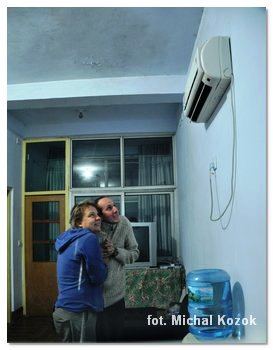 - in the contract they promised 50 square meters apartment, but in fact we got an old room, half size than expected. There was a mould on the ceiling, and tragic freezing bathroom (temperature almost like outside). The light had to be switch on even during a day, as there was too dark. Window view – rubbish dump and concrete wall. Thin cover of concrete floor required to wear thick shoe soles. There was so cold, that they installed a second air-conditioner, which finally could rise the room temperature above 20 degrees. They also organized a kitchen - purchased gas stove and a few pots. Unfortunately, we did not get the washing machine, and the laundries in the town didn't accept our socks and underwear. We had a fridge, useless TV (no sports or English channels), hot shower, internet connection, drinking bottled water, bed, wardrobe and armchairs. In return for those terrible living conditions I have asked the school to arrange someone to teach us Chinese language. They promised to do it, but after six no effective weeks finally we realized that they fooled us again. We organized a student who gave us an hour lesson twice a week. But generally speaking there is not so bad with the apartments - after a whole year stay in China, we saw a dozen houses of foreign teachers and none of them had so terrible conditions like us. Their apartments were "normal" - bright, warm, clean, the floor on which you can walk barefoot, bathroom where you won't freeze. Some of them even were supplied with computer and a printer.
- in the contract they promised 50 square meters apartment, but in fact we got an old room, half size than expected. There was a mould on the ceiling, and tragic freezing bathroom (temperature almost like outside). The light had to be switch on even during a day, as there was too dark. Window view – rubbish dump and concrete wall. Thin cover of concrete floor required to wear thick shoe soles. There was so cold, that they installed a second air-conditioner, which finally could rise the room temperature above 20 degrees. They also organized a kitchen - purchased gas stove and a few pots. Unfortunately, we did not get the washing machine, and the laundries in the town didn't accept our socks and underwear. We had a fridge, useless TV (no sports or English channels), hot shower, internet connection, drinking bottled water, bed, wardrobe and armchairs. In return for those terrible living conditions I have asked the school to arrange someone to teach us Chinese language. They promised to do it, but after six no effective weeks finally we realized that they fooled us again. We organized a student who gave us an hour lesson twice a week. But generally speaking there is not so bad with the apartments - after a whole year stay in China, we saw a dozen houses of foreign teachers and none of them had so terrible conditions like us. Their apartments were "normal" - bright, warm, clean, the floor on which you can walk barefoot, bathroom where you won't freeze. Some of them even were supplied with computer and a printer.
 - travel allowances were amounted to 1,100 Y per person per semester. In our case school did not want to pay it, same as for flight ticket and winter vacation. Worse, after the winter holidays they suddenly announced that we had to have tickets from the journeys. I wonder why they are so dishonest, as we just talked before our holiday departure. Anyway those “allowances” are not reimbursement. We were hard in this case and finally they gave up, but it took them about three months (we heard “we pay you tomorrow” about 30 times).
- travel allowances were amounted to 1,100 Y per person per semester. In our case school did not want to pay it, same as for flight ticket and winter vacation. Worse, after the winter holidays they suddenly announced that we had to have tickets from the journeys. I wonder why they are so dishonest, as we just talked before our holiday departure. Anyway those “allowances” are not reimbursement. We were hard in this case and finally they gave up, but it took them about three months (we heard “we pay you tomorrow” about 30 times).
- with winter holiday is a similar story. The problem with it has two aspects - first they did not want to pay us, and second, they told us that this year the holiday will last two and a half month. Despite contract assurances they explained that we didn't work since the beginning of the semester. After the intervention in the higher office our university graciously agreed to pay us money for one month vacation. The remainder period of the holidays we spent "unemployed". Of course their "agreed" does not mean that they paid easily and quickly. For several weeks they were breaking promises and every time we heard "tomorrow". Not only that, as one day they requested from us that we must work for free an additional week – we couldn't agree to further changes.
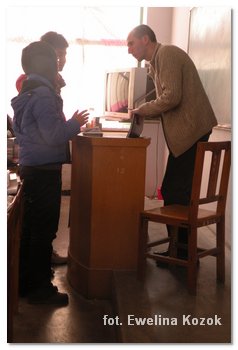 - we also supposed to get a sick leave and additional holidays. However, no one informed us for Christmas or New Year, and it was during student's final exams – anyway how could I not come to the exam and tell the students that there won't be the final assessment? Theoretically, insurance should be also obtained. The school said they do it later. According to Chinese promises I recommend to cover insurance yourselves.
- we also supposed to get a sick leave and additional holidays. However, no one informed us for Christmas or New Year, and it was during student's final exams – anyway how could I not come to the exam and tell the students that there won't be the final assessment? Theoretically, insurance should be also obtained. The school said they do it later. According to Chinese promises I recommend to cover insurance yourselves.
Our and ours friends experience leads us to understand the fact: "When we've signed the contract, it really does not mean that it will be exactly as shown in our document". Actually, you can be sure that there will be many problems. We had a negative experience and we met lots of foreigner teachers who had similar situations. Unfortunately the Chinese people don't care about keeping the promise (written or verbal), so having a contract is worth remember that is not Europe, and the agreement has own rules here.
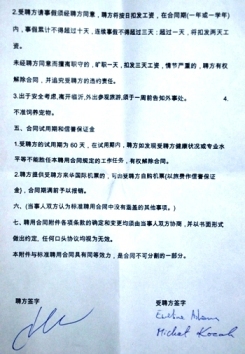 I will mention that the contract has a probation period, usually two or three months. This is the time when the school may cancel your service. Of course, when firing you they have to give reasons for your incompetence, irresponsibility or failure to comply with an agreement in the contract. For example, the reason can be your poor methodology, speaking against an official views on issues like: religious, cultural, political, about Tibet, Taiwan, etc. It can also apply to financial penalties for being late or leaving the classes before the class is finished. Theoretically, for contract cancellation without reasons covered by the contract, breaking party pays a fine from 500 to 2000 U.S. dollars. Also teachers dating with students, or even with other Chinese teachers, are consider negatively by the school, and you can expect troubles.
I will mention that the contract has a probation period, usually two or three months. This is the time when the school may cancel your service. Of course, when firing you they have to give reasons for your incompetence, irresponsibility or failure to comply with an agreement in the contract. For example, the reason can be your poor methodology, speaking against an official views on issues like: religious, cultural, political, about Tibet, Taiwan, etc. It can also apply to financial penalties for being late or leaving the classes before the class is finished. Theoretically, for contract cancellation without reasons covered by the contract, breaking party pays a fine from 500 to 2000 U.S. dollars. Also teachers dating with students, or even with other Chinese teachers, are consider negatively by the school, and you can expect troubles.
After the probation period (in our case only two weeks) the school gave us a new contract, which already included the specific dates. And it would be quite right, but we were given a contract that had an ending date in January! As you can see the university didn't want to pay for school holiday, they tried to sign another contract at the start of the next semester (instead one full-year contract - two half-year ones). We didn't agree to sign the document with changes expiration dates. Since that moment the horror began - they didn't respect the contract rules, university was figuring how to make economic benefits. We got a translator, whose task was to communicate between us and the school. Unfortunately, he proved to be a good translator only when he liked it. For most of my emails I never got any answers. In one word - ignorance and dishonesty. The worst thing in the whole system was that we really had no institution to appeal. We could not find an organization that would represent our rights - after the agency took our commission, they didn't care about us.
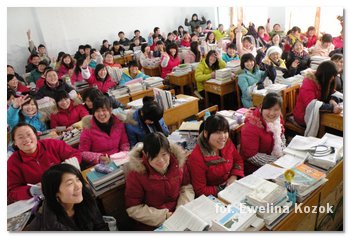 How look the classes? First of all, I was afraid of my English level, especially when it comes to grammar. Our twenty years old students had in theory an average of 5-7 years of learning English. However, in practice it proved to be quite poor. The problem in China is the fact that students have a good theoretical knowledge (mainly in the grammar field), but had a problem to use it in practice. Our main task was convict the students to speak. Because students are very shy, especially in the presence of "western culture". It was necessary to interest, motivate, get used to etc. Before the first class I asked the officials – "Would you give us some teaching materials"? "Hmm, what do you want?" - teacher respond. "Well, a book, photo copies, teaching plan, information about the classes, etc”. Before we came here they told us that on the campus there are more than 100 other foreigner teachers, so we thought that in case of trouble we will have someone to ask for help, tips or materials. But neither the books nor the other foreign teachers were here. I entered my first class without knowing their level. I was shocked when it turned out that the classes do not count 18 students, but 80. Finally, after a few weeks we received two books, but they were not the best one and students didn't have these books anyway. We have made teaching plan and found out the invaluable help on internet. Of course school was keeping the disorganization, changing the plan or announcing some decisions in the last moments. They informed us that we have exams with some classes just a few days earlier. Any normal teacher knows that the
How look the classes? First of all, I was afraid of my English level, especially when it comes to grammar. Our twenty years old students had in theory an average of 5-7 years of learning English. However, in practice it proved to be quite poor. The problem in China is the fact that students have a good theoretical knowledge (mainly in the grammar field), but had a problem to use it in practice. Our main task was convict the students to speak. Because students are very shy, especially in the presence of "western culture". It was necessary to interest, motivate, get used to etc. Before the first class I asked the officials – "Would you give us some teaching materials"? "Hmm, what do you want?" - teacher respond. "Well, a book, photo copies, teaching plan, information about the classes, etc”. Before we came here they told us that on the campus there are more than 100 other foreigner teachers, so we thought that in case of trouble we will have someone to ask for help, tips or materials. But neither the books nor the other foreign teachers were here. I entered my first class without knowing their level. I was shocked when it turned out that the classes do not count 18 students, but 80. Finally, after a few weeks we received two books, but they were not the best one and students didn't have these books anyway. We have made teaching plan and found out the invaluable help on internet. Of course school was keeping the disorganization, changing the plan or announcing some decisions in the last moments. They informed us that we have exams with some classes just a few days earlier. Any normal teacher knows that the  assessments issue for the final exam is not fair, nor methodical. But how can I carry systematic lessons, a fair notes system for student work throughout the semester, when they often were changing the classes, hours, exams, etc. what didn't allow me for any logic planning. Theoretically we should get the person coordinating our work, but no one cared about the student education. We were there just to raise the prestige of the university, which employs foreigner teachers.
assessments issue for the final exam is not fair, nor methodical. But how can I carry systematic lessons, a fair notes system for student work throughout the semester, when they often were changing the classes, hours, exams, etc. what didn't allow me for any logic planning. Theoretically we should get the person coordinating our work, but no one cared about the student education. We were there just to raise the prestige of the university, which employs foreigner teachers.
In our school system I can distinguish two groups of people. The first group are teachers and ordinary office workers who in most cases were very helpful, pleasant and effective. The second group are authorities that seemed make decisions. Unfortunately this first group, much larger one, very often depended on the second group, and had their hands tied and couldn't help us. With the authorities we had contact mainly at banquets (boycotted by me in the second semester), when with drinking vodka disappeared all promises.
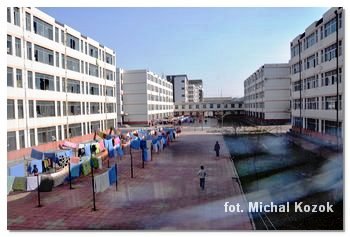 We were living in the campus. Other Chinese teachers lived outside the school walls, in much more pleasant conditions. We traveled here with the information that there are close to 100 foreign teachers, but the translator finally announced: "No, not a hundred, but five". "Well, it is not too bad, which countries they are from?" - we asked on the way from the airport. "Actually, two left and one moved" – translator responded. "Ok, and the other two where they are from?". His answer was great – "You are these two". So, it turned out that there was not even a single teacher from abroad, but also the whole town has no other foreigners. Sorry, the translator told us that in one factory some Koreans work:) Living in such a small town has its advantages and disadvantages. According to some sources as many as 1.2 million people live here, but the town center has not even a 4-storey building. I like the big cities, because there are big opportunities - particularly in terms of events like cultural, sport and social. I was quite scared on Yishui arrival – we reached the town at 11 pm, darkness and street emptiness scared me, we have seen only some factories and concrete countryside buildings. We were convinced that we are in totally rural area.
We were living in the campus. Other Chinese teachers lived outside the school walls, in much more pleasant conditions. We traveled here with the information that there are close to 100 foreign teachers, but the translator finally announced: "No, not a hundred, but five". "Well, it is not too bad, which countries they are from?" - we asked on the way from the airport. "Actually, two left and one moved" – translator responded. "Ok, and the other two where they are from?". His answer was great – "You are these two". So, it turned out that there was not even a single teacher from abroad, but also the whole town has no other foreigners. Sorry, the translator told us that in one factory some Koreans work:) Living in such a small town has its advantages and disadvantages. According to some sources as many as 1.2 million people live here, but the town center has not even a 4-storey building. I like the big cities, because there are big opportunities - particularly in terms of events like cultural, sport and social. I was quite scared on Yishui arrival – we reached the town at 11 pm, darkness and street emptiness scared me, we have seen only some factories and concrete countryside buildings. We were convinced that we are in totally rural area. 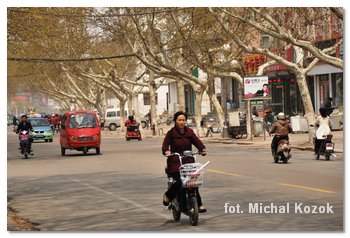 It was a miracle when we discovered, it's not so bad as it seemed last night. However in our “village” there was nothing really worth seeing - no English-speaking cinema or the theater, no any sport event, no even a ordinary pub where you could go for a beer. The town was going to sleep at 9 pm (only the KTV clubs worked, but you need a group of people to join it). And we did have no one to come with - teachers led an ideal example of a perfect Chinese family, so no social meetings in the evening. Students were locked in the dormitory, even on weekends. From the other side living in such a small town was our way to know the real China, a normal ordinary everyday life. We were the same attraction for locals as they were for us. In general, wherever we came people got excited, shop assistants took out cameras, taxi drivers wanted pick us up when we were doing running session, the restaurants owners were extremely nice etc. Actually people on the street made on us very positive impression - always smiling, helpful and honest.
It was a miracle when we discovered, it's not so bad as it seemed last night. However in our “village” there was nothing really worth seeing - no English-speaking cinema or the theater, no any sport event, no even a ordinary pub where you could go for a beer. The town was going to sleep at 9 pm (only the KTV clubs worked, but you need a group of people to join it). And we did have no one to come with - teachers led an ideal example of a perfect Chinese family, so no social meetings in the evening. Students were locked in the dormitory, even on weekends. From the other side living in such a small town was our way to know the real China, a normal ordinary everyday life. We were the same attraction for locals as they were for us. In general, wherever we came people got excited, shop assistants took out cameras, taxi drivers wanted pick us up when we were doing running session, the restaurants owners were extremely nice etc. Actually people on the street made on us very positive impression - always smiling, helpful and honest.
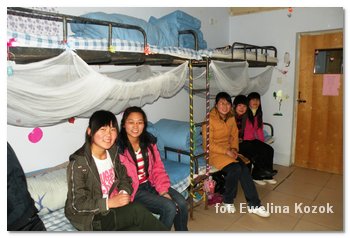 Student life surprised us. They were waking up at 6 am, went jogging, and then attended the class. From 6:30 am to 9:00 pm they spent days in the cold classes (with meals breaks). At 9:30 pm they were locked in the dormitories (even on weekends), and half an hour later the lights were switched off (during winter even earlier)! During the daytime the dormitories were also closed, as students should be learning all the time. In May two accidents happened in school, so the officials found a “stupid” solution to fix a problem – they closed students in dormitories during their lunch time:( Free from classes was only Saturday, and on Sunday evening students had to return to the classrooms. I felt sorry for them - the best time of their life in such strict control. And I'm not sure if we should complain about our living conditions? The student
Student life surprised us. They were waking up at 6 am, went jogging, and then attended the class. From 6:30 am to 9:00 pm they spent days in the cold classes (with meals breaks). At 9:30 pm they were locked in the dormitories (even on weekends), and half an hour later the lights were switched off (during winter even earlier)! During the daytime the dormitories were also closed, as students should be learning all the time. In May two accidents happened in school, so the officials found a “stupid” solution to fix a problem – they closed students in dormitories during their lunch time:( Free from classes was only Saturday, and on Sunday evening students had to return to the classrooms. I felt sorry for them - the best time of their life in such strict control. And I'm not sure if we should complain about our living conditions? The student
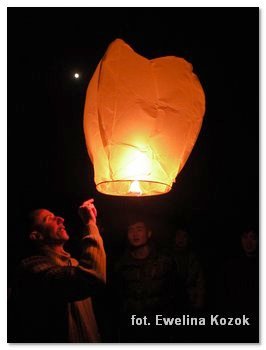 dormitory room was a half smaller than ours, there were three bunk beds to accommodate six students, no heating (winter in the rooms around 10°C). I still do not know whether this was a education system, or just saving on electricity? On the other hand those students are adults, after leaving this school they would be approximately 22 to 25 years old and will gradually setting up the families. And here those dormitories are divided – some for girls, and boys in the other buildings. Even the visit in a dorm of the opposite sex during the day was prohibited.
dormitory room was a half smaller than ours, there were three bunk beds to accommodate six students, no heating (winter in the rooms around 10°C). I still do not know whether this was a education system, or just saving on electricity? On the other hand those students are adults, after leaving this school they would be approximately 22 to 25 years old and will gradually setting up the families. And here those dormitories are divided – some for girls, and boys in the other buildings. Even the visit in a dorm of the opposite sex during the day was prohibited.
Despite considerable criticism of the above, I still recommend a trip to China. But better to expect that would be different than their promise. In the event when college crosses the limit of your mental strength, you can always jump on a plane and return home. In our case this was not a trip for profit, but just for adventure and new experience. I actually achieved a goal, because apart from the financial problems associated with the contract, everything was in order. We have seen China in its bright and dark colors. We don't regret the decision about coming here and we might consider to return here one day, of course next time to another college, and probably also to the warmer region.
back to top



 Schools usually offer 16 to 20 hours a week. Wages are rarely less than 4,000 Y per month (400 €) and for professional teachers can reach even more than 10,000 Y (1,000 €). In addition to salary, usually the package also includes a return plane ticket to China (a half-year contract just one-way ticket), and accommodation with all bill expenses. We should also get a travel allowances, paid monthly holiday (1-year contract), sick leave and extra holidays during: two weeks in Chinese New Year (Spring Festival), the first week in May, same in October, two days on Christmas.
Schools usually offer 16 to 20 hours a week. Wages are rarely less than 4,000 Y per month (400 €) and for professional teachers can reach even more than 10,000 Y (1,000 €). In addition to salary, usually the package also includes a return plane ticket to China (a half-year contract just one-way ticket), and accommodation with all bill expenses. We should also get a travel allowances, paid monthly holiday (1-year contract), sick leave and extra holidays during: two weeks in Chinese New Year (Spring Festival), the first week in May, same in October, two days on Christmas.  - 16 hours a week, lesson lasts for 45 minutes and brakes take 10 minutes. In the first semester I had 15 hours, Evelina for 6 weeks even had less than 10 hours. Classes weren't usually in a row exp. maximum of 3 units in the row, but most times happened two hours in the morning and one hour in the afternoon (or vice versa). I had a fixed schedule for the first half year, but the next semester each week was different. In the first semester I had always the same classes on the same English level, so I had to prepare only one lesson for a whole week and repeat it in all classes. The next semester I had a different classes and different levels each week - a lot more work, but less monotony. Classes were held from Monday to Friday from 8 am to 4:30 pm. In addition we were asked to lead "English Corner" - meeting with students with voluntary participation.
- 16 hours a week, lesson lasts for 45 minutes and brakes take 10 minutes. In the first semester I had 15 hours, Evelina for 6 weeks even had less than 10 hours. Classes weren't usually in a row exp. maximum of 3 units in the row, but most times happened two hours in the morning and one hour in the afternoon (or vice versa). I had a fixed schedule for the first half year, but the next semester each week was different. In the first semester I had always the same classes on the same English level, so I had to prepare only one lesson for a whole week and repeat it in all classes. The next semester I had a different classes and different levels each week - a lot more work, but less monotony. Classes were held from Monday to Friday from 8 am to 4:30 pm. In addition we were asked to lead "English Corner" - meeting with students with voluntary participation.  - the school paid us 4,000 Y per month per person (400 €). "Monthly paid" only in theory - in fact they never paid on time, sometimes with several weeks delay and we had to chase them to get a payment. Maybe 4,000 Y is not so much, but life is cheap here! Food does not cost more than 1,000 Y per month per person and we almost didn't have other major expenses - gym pass for 150 Y and massage four times a month for 200 Y. We spent the rest of savings during the holiday breaks and weekend trips. According to the contract we could exchange monthly 30% earned yuan into dollar.
- the school paid us 4,000 Y per month per person (400 €). "Monthly paid" only in theory - in fact they never paid on time, sometimes with several weeks delay and we had to chase them to get a payment. Maybe 4,000 Y is not so much, but life is cheap here! Food does not cost more than 1,000 Y per month per person and we almost didn't have other major expenses - gym pass for 150 Y and massage four times a month for 200 Y. We spent the rest of savings during the holiday breaks and weekend trips. According to the contract we could exchange monthly 30% earned yuan into dollar. 





 We were living in the campus. Other Chinese teachers lived outside the school walls, in much more pleasant conditions. We traveled here with the information that there are close to 100 foreign teachers, but the translator finally announced: "No, not a hundred, but five". "Well, it is not too bad, which countries they are from?" - we asked on the way from the airport. "Actually, two left and one moved" – translator responded. "Ok, and the other two where they are from?". His answer was great – "You are these two". So, it turned out that there was not even a single teacher from abroad, but also the whole town has no other foreigners. Sorry, the translator told us that in one factory some Koreans work:) Living in such a small town has its advantages and disadvantages. According to some sources as many as 1.2 million people live here, but the town center has not even a 4-storey building. I like the big cities, because there are big opportunities - particularly in terms of events like cultural, sport and social. I was quite scared on Yishui arrival – we reached the town at 11 pm, darkness and street emptiness scared me, we have seen only some factories and concrete countryside buildings. We were convinced that we are in totally rural area.
We were living in the campus. Other Chinese teachers lived outside the school walls, in much more pleasant conditions. We traveled here with the information that there are close to 100 foreign teachers, but the translator finally announced: "No, not a hundred, but five". "Well, it is not too bad, which countries they are from?" - we asked on the way from the airport. "Actually, two left and one moved" – translator responded. "Ok, and the other two where they are from?". His answer was great – "You are these two". So, it turned out that there was not even a single teacher from abroad, but also the whole town has no other foreigners. Sorry, the translator told us that in one factory some Koreans work:) Living in such a small town has its advantages and disadvantages. According to some sources as many as 1.2 million people live here, but the town center has not even a 4-storey building. I like the big cities, because there are big opportunities - particularly in terms of events like cultural, sport and social. I was quite scared on Yishui arrival – we reached the town at 11 pm, darkness and street emptiness scared me, we have seen only some factories and concrete countryside buildings. We were convinced that we are in totally rural area. 

